SUMMARY
This is AI generated summarization, which may have errors. For context, always refer to the full article.
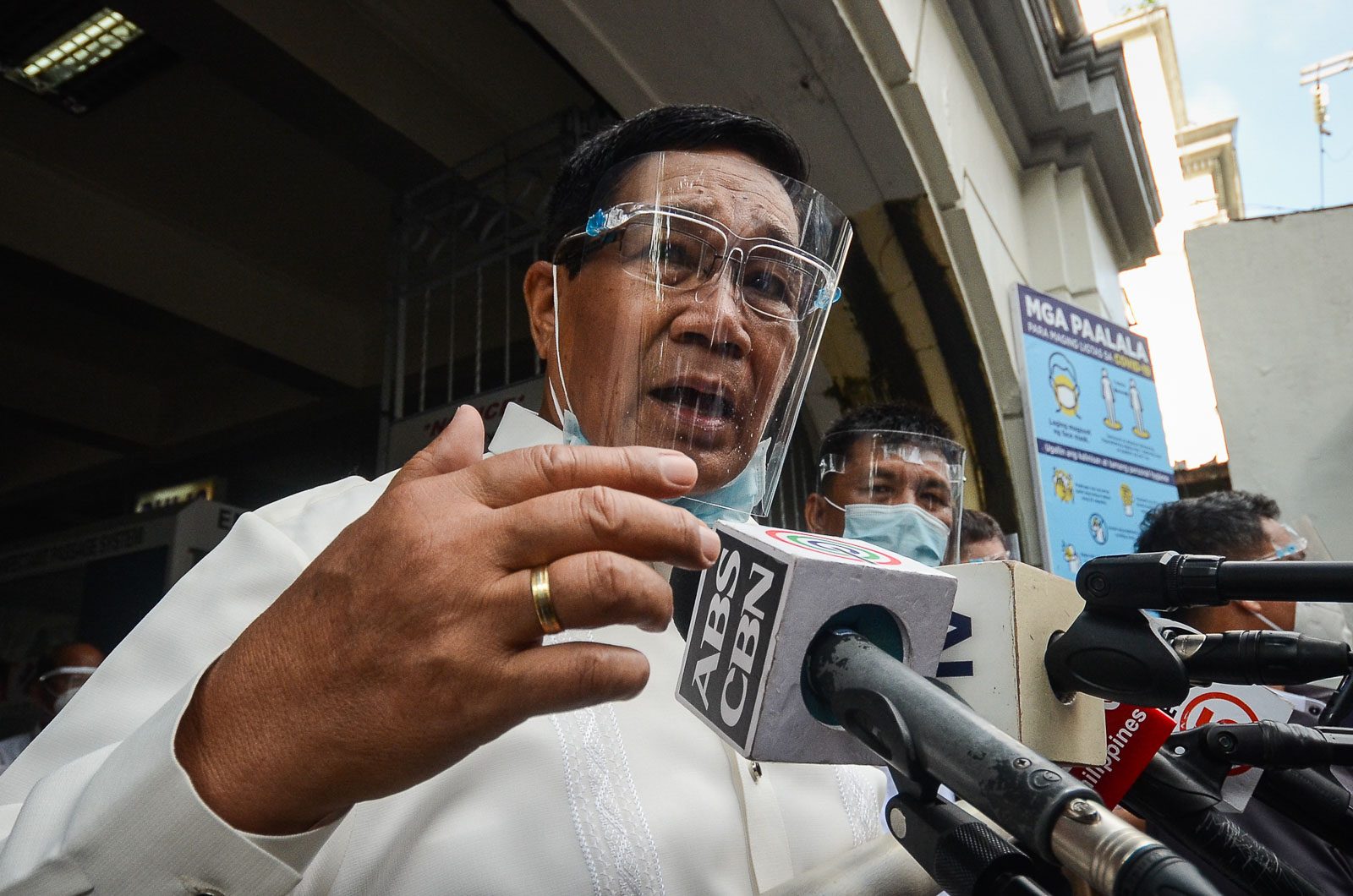
The Supreme Court will ask National Security Adviser Hermogenes Esperon Jr to explain why some government officials have linked organizers of community pantries to the New Peoples’ Army (NPA), when it resumes oral arguments on the anti-terror law petitions on May 4.
Esperon would have been asked to respond to the questions of Associate Justice Rosmari Carandang to Assistant Solicitor General Raymund Rigodon during Day 5 of the anti-terror law oral arguments on Tuesday, April 27, but there was no more time.
“Several officials of the govenment have made statements associating the organizers of the pantries to the NPA. What is the basis of the government in saying that? Do you have any idea?” Carandang asked Rigodon on Tuesday.
Rigodon and fellow ASG Marissa dela Cruz-Galandines were made to answer the interpellations on Tuesday, as Solicitor General Jose Calida settled for just delivering the opening statement for the government, the first time ever that he ducked out grilling in oral arguments.
“I have no personal knowledge,” Rigodon said.
“You have no knowledge? That some government officials are associating people with good heart [to the NPA]?” Carandang prodded.
“Perhaps we can consult the National Security Adviser,” Rigodon said.
Esperon attended the oral arguments on Zoom but the justices ran out of time on Tuesday. He will be called back to the next session on May 4.
“We can question him later. We will toss to him the questions later on. I have questions for General Esperon. It’s better to be answered by General Esperon later on,” said Carandang, the case lead for the 37 petitions questioning the constitutionality of the anti-terror law.
Esperon had said himself that they will “look into organizers especially if they advertise their organization that would be traced to the legal fronts of the front organization of the CPP-NPA.”
Before he was gagged, Lieutenant General Antonio Parlade Jr, spokesperson fo the National Task Force to End Local Communist Armed Conflict (NTF-ELCAC), likened the rapid spread of community pantries to the work of “Satan.”
There is a pending motion to also compel Parlade to explain his threats against petitioners and a journalist covering the case.
Providing material support
Before Carandang got to what she called the “hot issue of community pantries,” she quizzed Rigodon on Section 12 of the anti-terror law that punishes “providing material support to terrorists” with 12 years up to life imprisonment.
Carandang’s line of questioning is this: When is helping or humanitarian assistance or charitable donation considered a crime under Section 12?
“The one providing material support must be aware that the entity or individual he is giving support [to] is engaged in terrorism, your honor, or promotes terrorism, your honor. If one is not aware that this entity is engaged in terrorism, how can that be considered as providing material support?” said Rigodon.
Rigodon pointed out that Section 13 of the law specifically exempts the International Committee of the Red Cross (ICRC), the Philippine Red Cross (PRC), and “other state-recognized impartial humanitarian partners or organizations” from Section 12.
Carandang asked if the Philippine government should widen the exemption to also include any kind of medical support, and even religious materials.
Rigodon was not inclined to agree.
“There is a possibility your honor that charitable organizations or those engaged in civic…in humanitarian assistance may be used as fronts by these terrorist groups for getting supplies, medicines, or funds which they can use for their terrorist activities, your honor,” said Rigodon.
Can the Church be faulted?
Carandang asked, what about the Church?
Religious leaders and groups which filed their own petitions highlighted a potential risk of guilt by association, arguing that the religious sector has always helped marginalized groups – the same groups that have been red-tagged.
The Anti-Terrorism Council has designated the Communist Party of the Philippines-NPA (CPP-NPA) as a terror group, and the government has moved to freeze “related accounts.” Designation is a distinct power of the council, separate from the court process of proscription.
Even before the passage of the anti-terror law, the government has frozen the assets of the nun group Rural Missionaries of the Philippines (RMP), accusing them of financing the NPA.
“So the state is not recognizing the Church as an organziation providing charitable help, contribution to people? Even Congress is wary of the activities of the Church, is that what you mean?” asked Carandang.
“Perhaps Congress just wants to ensure that the humanitarian assistance will be given to those who really need it and will not be utilized to aid violent activities,” said Rigodon.
Carandang asked what church leaders can do if they are arrested on the basis of providing material support to terrorists. Rigodon said that they can argue lack of knowledge that their beneficiaries are involved in terror activities.
“The government will not invest good faith in the charitable institutions? Church organizations? Providing support to poor people?” said Carandang.
“As long as such support is not given to identified terorist organizations,” said Rigodon.
Chief Justice Alexander Gesmundo said Carandang can continue her questioning, including of Esperon, in the next session on May 4.
Here are stories from Day 5:
- Calida red-tags Colmenares, progressives before Supreme Court
- Calida avoids grilling; aides trip on anti-terror law questions
– Rappler.com
Add a comment
How does this make you feel?

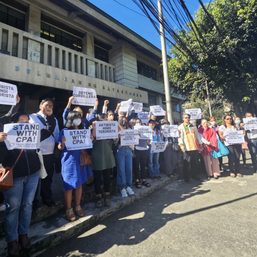
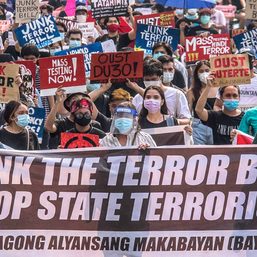
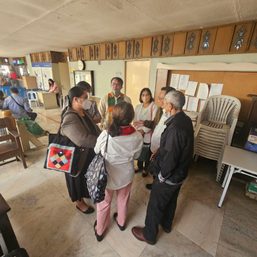
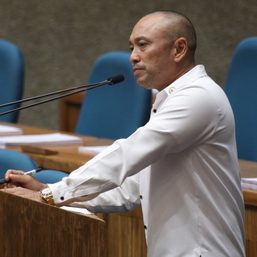
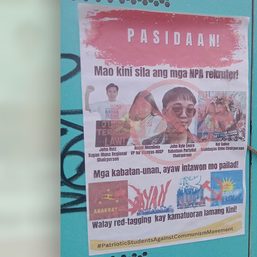
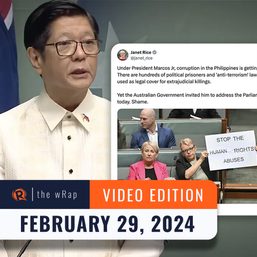
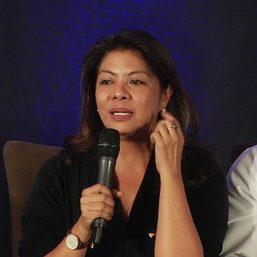
![[OPINION] Jhed and Jonila’s fight for justice](https://www.rappler.com/tachyon/2024/02/TL-jhed-and-jonilla.jpg?resize=257%2C257&crop=411px%2C0px%2C1080px%2C1080px)
There are no comments yet. Add your comment to start the conversation.